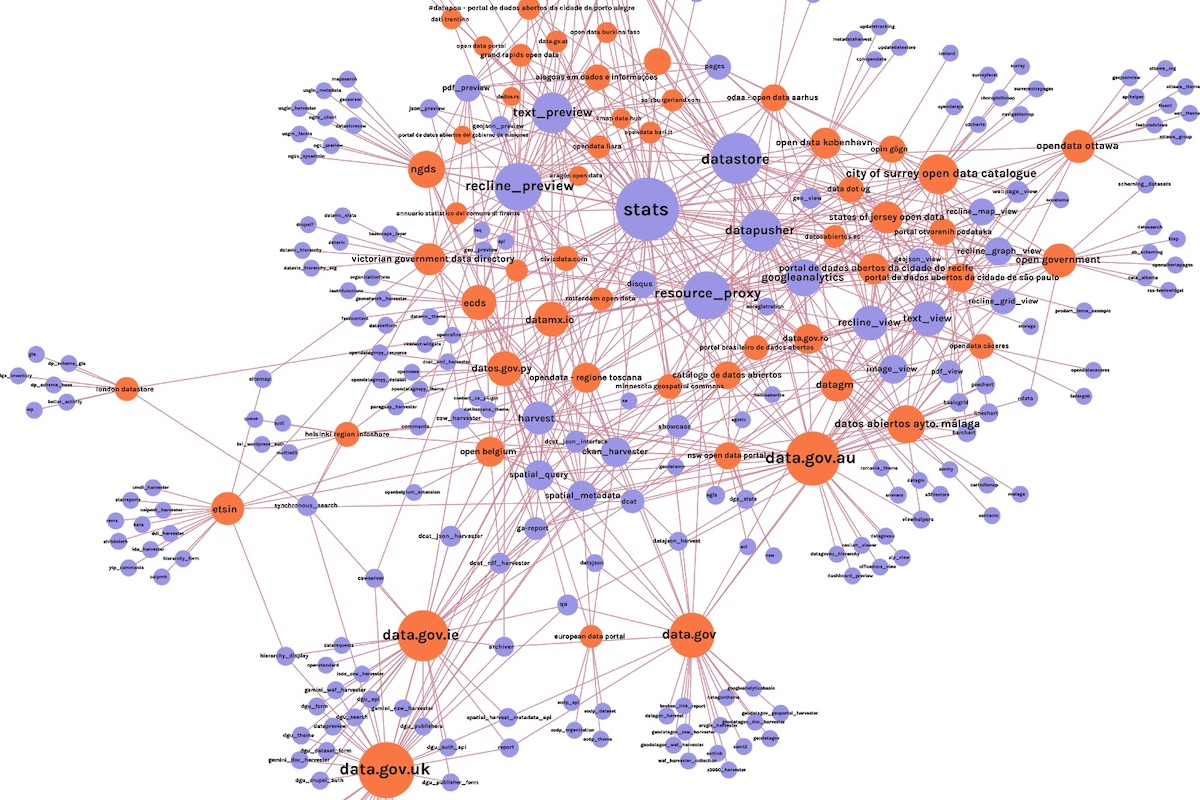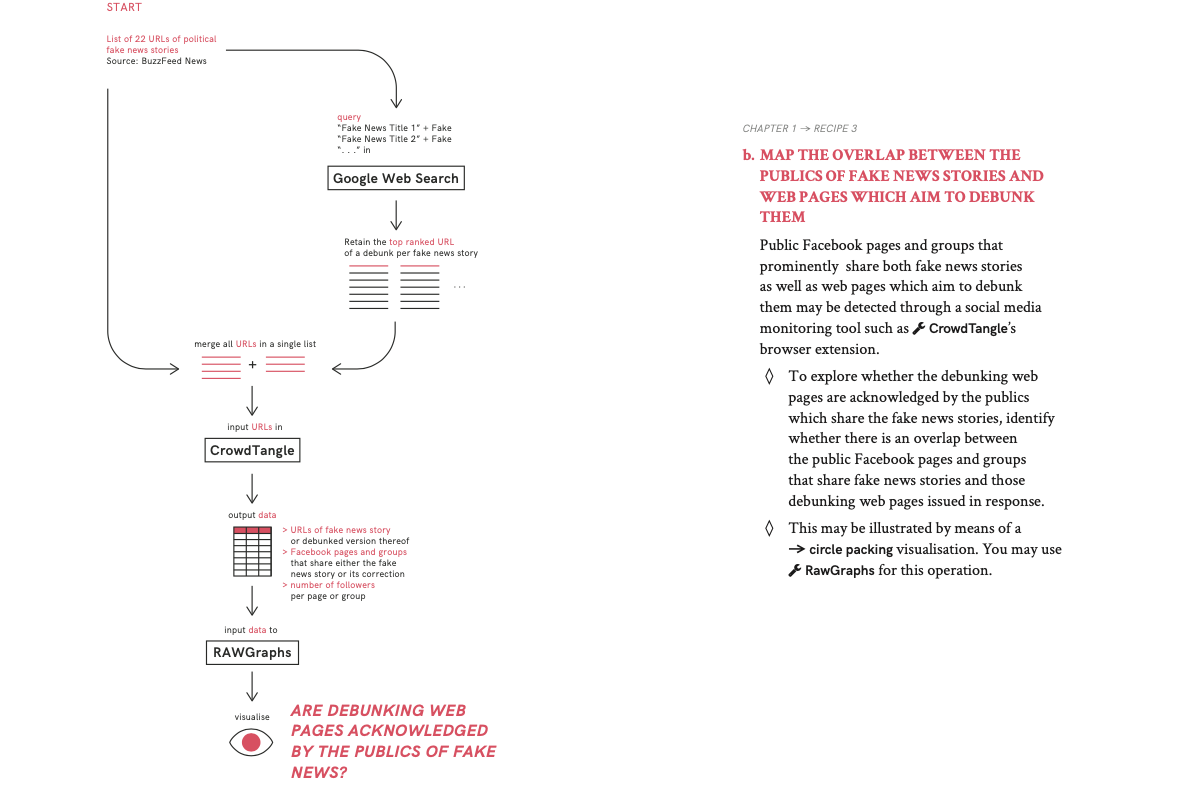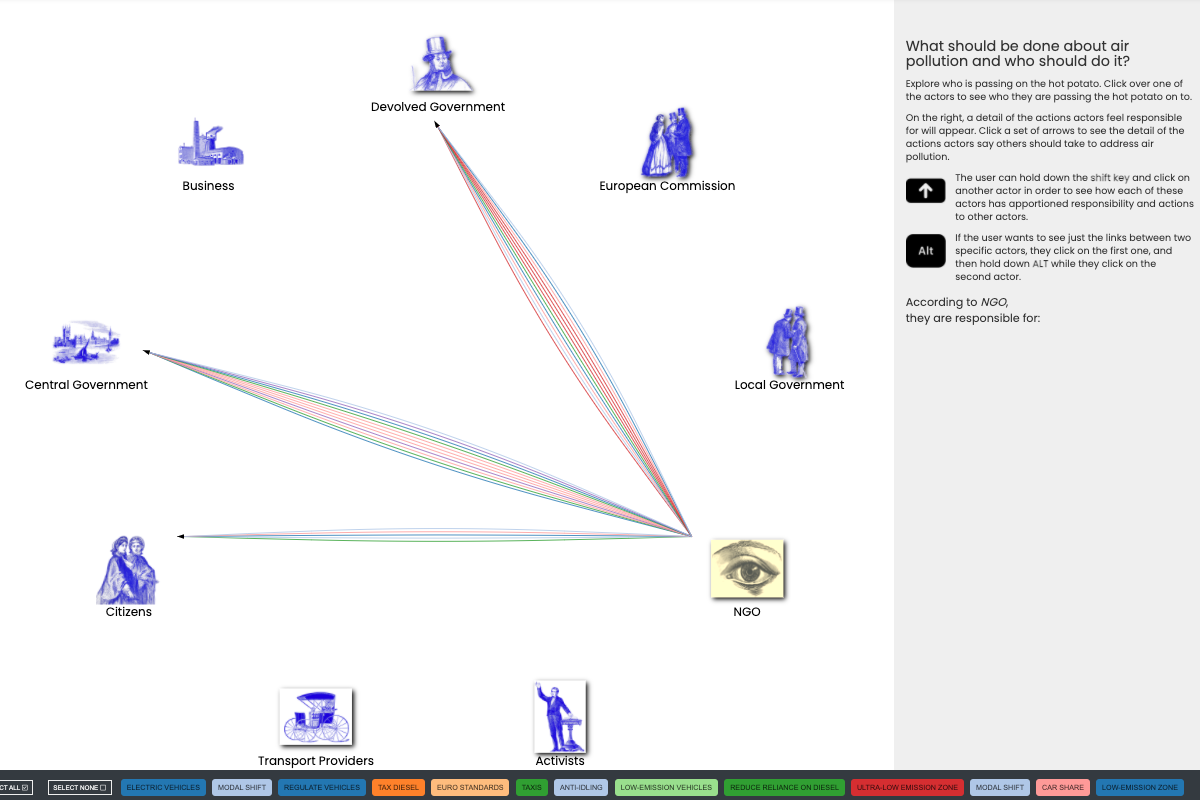Affiliation: DensityDesign Lab
Data Portal Explorer

What do data portals do? This initiative explores digital methods and approaches for studying data portals as online devices.
This includes gathering an international research group on data portal studies, as well as developing a prototype tool and open source software library for repurposing data portal metadata in order to examine public sector datafication and the configuration of portals as sites of participation around public data.
There is a repository, package and documentation for the prototype tool.
For further background on this project see here and:
- Gray, J. W. Y. (2023) What do data portals do? Tracing the politics of online devices for making data public. Data & Policy, 5, E10.
COVID-19 Testing Situations on Twitter

A new challenge that the COVID-19 pandemic has ignited is testing – and not testing – for the virus, as a central concern among the population. Much of the debate has focused on the merits of different types of tests and testing infrastructures (PCR; anti-body; symptom-based testing through apps). However, equally remarkable about COVID testing is the locations in which it takes place and is expected to place, in everyday places beyond the laboratory, like the home, and the parking lots of superstores.
This project consists in a series of workshops for the collaborative interpretation of Twitter data relating to COVID-19 in order to facilitate a dialogue about the social life of testing, across expert – lay distinctions. The aim is to draw out from Twitter reporting on COVID-19 testing a social understanding of COVID-19 testing as everyday situation, and, potentially, as tests of society. We are also interested in developing and documenting approaches to curating and infrastructuring environments for collaborative interpretative data analysis, given the unusually large Twitter datasets that have been gathered across our institutions.
For further details see:
- Marres, N., Colombo, G., Bounegru, L., Gray, J. W. Y., Gerlitz, C., & Tripp, J. (2023). Testing and Not Testing for Coronavirus on Twitter: Surfacing Testing Situations Across Scales With Interpretative Methods. Social Media + Society, 9(3).
- Workshop at Centre for Interdisciplinary Methodologies, University of Warwick, June 2020
- Workshop at Digital Methods Initiative Summer School, University of Amsterdam, July 2020
- “Digital Sociology: Concepts, Methods, Practices”, Master’s intensive module, University of St Gallen, Autumn 2020
- Workshop at University of Siegen, December 2021

Digital Methods Recipes

How can we share different ways of doing things with digital data, methods and infrastructures? How can text, images, video, GIFs and other materials be used to provide accounts of digital methods, cultivate sensibilities towards interpretive work, surface tacit knowledge and encourage reflection on decisions, tools, devices, assumptions and materials?
This is a project to gather, exchange and share digital methods recipes and “how-tos” for research, teaching and collaborations from across the Public Data Lab.
You can see a preview of some of these here: http://recipes.publicdatalab.org/
A set of recipes developed as a collaboration between digital methods researchers at the Public Data Lab and digital journalists at First Draft can be found at: https://firstdraftnews.org/long-form-article/digitalrecipes/
Investigating Infodemic

Responding to the World Health Organisation’s warning that misinformation related to COVID-19 constitutes an “infodemic,” this project studies conspiracy theories as a particularly seductive kind of misinformation.
Infodemic: Combatting COVID-19 Conspiracy Theories is using methods from digital humanities and cultural studies to understand how and why conspiracy narratives circulate in different platforms and online spaces during the crisis.
The methodologies include analysing the historical roots of the conspiracy theories now circulating, how they have mutated during the pandemic, and how they contribute to both community and division. The latter practices constitute a foundation for looking at who has been promoting and spreading them, what form they take on the various social media platforms, and why some theories have gained more traction than others. The project will also assess the effectiveness of the varying interventions by social media companies.
The project involves developing collaborative digital methods investigations with journalists, researchers and students as part of “engaged research led teaching” activities at King’s College London and the University of Amsterdam. This has contributed to a set of digital investigations recipes with First Draft a long read on investigating troubling content on Amazon with the European Journalism Centre as well as the following investigations:
- “Conspiracy theories run wild on Amazon”, Politico
- “Finding misinformation with ‘rumor cues’”, First Draft
- “Big Tech’s trying to stop coronavirus misinformation. It’s not enough.”, Politico
- “Amazon Is Pushing Readers Down A “Rabbit Hole” Of Conspiracy Theories About The Coronavirus”, BuzzFeed News
- “Complotten in een crisis: gouden combinatie”, NOS (Dutch Broadcasting Foundation)
- “How Amazon became an engine for anti-vaccine conspiracy theories”, Fast Company
- “Amazon is helping fund conspiracy theories”, Media Matters
The Fog of Finance

As part of this project we created an “Atlas of Offshore FDI” exploring financial relations between states through the flows of money from foreign direct investment (FDI). Its specificity is the effort to visualize the combinations and modifications of the flows of money for making sense of transnational economic activity as well as visual practices for representing uncertainty. While public data practices often emphasise and value the production of certainty , this project considers what data projects may learn from diverse cultures for visually representing, managing and articulating uncertainty.
It is a research project done in collaboration with the Tax Justice Network, a network of researchers and research centres, and the Public Data Lab. The experimental visual model is designed and developed by DensityDesign Research Lab.
For further details see:
- Mauri, M, Briones, Á, Gray, J., Haberly, D & Anderson, C 2021, Visualizing Offshore Foreign Direct Investments: The Atlas of Offshore. in Design Culture(s) Cumulus Conference Proceedings Roma 2021. pp. 1127-1143.
Save Our Air

Supported by OrganiCity and developed by the Public Data Lab, SaveOurAir is an exploration of the social and political aspects of “smart cities”. Its specificity is the effort to use digital data to stir (rather than settle) urban debate and to nurture (rather than purify) their multiple attachments.
Focussing on air quality, SaveOurAir explored three ways to make urban data more “local” and “politically relevant” and developed three experiments in data activation.
Giulia Cosentino
DensityDesign Lab – Politecnico di Milano
Matteo Sacchi
DensityDesign Lab – Politecnico di Milano
Chiara Piva
DensityDesign Lab – Politecnico di Milano